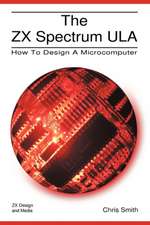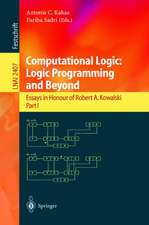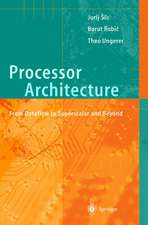Memory Performance of Prolog Architectures: The Springer International Series in Engineering and Computer Science, cartea 40
Autor Evan Ticken Limba Engleză Hardback – 31 dec 1987
| Toate formatele și edițiile | Preț | Express |
|---|---|---|
| Paperback (1) | 985.03 lei 6-8 săpt. | |
| Springer Us – noi 2011 | 985.03 lei 6-8 săpt. | |
| Hardback (1) | 992.11 lei 6-8 săpt. | |
| Springer Us – 31 dec 1987 | 992.11 lei 6-8 săpt. |
Din seria The Springer International Series in Engineering and Computer Science
- 24%
 Preț: 1041.98 lei
Preț: 1041.98 lei - 20%
 Preț: 643.50 lei
Preț: 643.50 lei - 18%
 Preț: 1225.62 lei
Preț: 1225.62 lei - 18%
 Preț: 965.02 lei
Preț: 965.02 lei - 20%
 Preț: 646.12 lei
Preț: 646.12 lei - 18%
 Preț: 948.79 lei
Preț: 948.79 lei - 20%
 Preț: 646.62 lei
Preț: 646.62 lei - 15%
 Preț: 637.46 lei
Preț: 637.46 lei - 20%
 Preț: 643.83 lei
Preț: 643.83 lei - 18%
 Preț: 949.23 lei
Preț: 949.23 lei - 20%
 Preț: 644.48 lei
Preț: 644.48 lei - 20%
 Preț: 994.92 lei
Preț: 994.92 lei - 20%
 Preț: 645.97 lei
Preț: 645.97 lei - 18%
 Preț: 946.87 lei
Preț: 946.87 lei - 20%
 Preț: 995.57 lei
Preț: 995.57 lei - 18%
 Preț: 956.99 lei
Preț: 956.99 lei - 20%
 Preț: 644.98 lei
Preț: 644.98 lei - 15%
 Preț: 649.54 lei
Preț: 649.54 lei - 18%
 Preț: 950.21 lei
Preț: 950.21 lei - 18%
 Preț: 1221.38 lei
Preț: 1221.38 lei - 18%
 Preț: 957.62 lei
Preț: 957.62 lei - 15%
 Preț: 643.99 lei
Preț: 643.99 lei - 18%
 Preț: 948.47 lei
Preț: 948.47 lei - 18%
 Preț: 947.35 lei
Preț: 947.35 lei - 20%
 Preț: 1284.65 lei
Preț: 1284.65 lei - 20%
 Preț: 1628.31 lei
Preț: 1628.31 lei - 20%
 Preț: 1285.78 lei
Preț: 1285.78 lei
Preț: 992.11 lei
Preț vechi: 1240.14 lei
-20% Nou
Puncte Express: 1488
Preț estimativ în valută:
189.86€ • 206.16$ • 159.48£
189.86€ • 206.16$ • 159.48£
Carte tipărită la comandă
Livrare economică 22 aprilie-06 mai
Preluare comenzi: 021 569.72.76
Specificații
ISBN-13: 9780898382549
ISBN-10: 0898382548
Pagini: 232
Ilustrații: XXII, 232 p.
Dimensiuni: 156 x 234 x 23 mm
Greutate: 0.56 kg
Ediția:1988
Editura: Springer Us
Colecția Springer
Seria The Springer International Series in Engineering and Computer Science
Locul publicării:New York, NY, United States
ISBN-10: 0898382548
Pagini: 232
Ilustrații: XXII, 232 p.
Dimensiuni: 156 x 234 x 23 mm
Greutate: 0.56 kg
Ediția:1988
Editura: Springer Us
Colecția Springer
Seria The Springer International Series in Engineering and Computer Science
Locul publicării:New York, NY, United States
Public țintă
ResearchCuprins
1. Introduction.- 1.1. What is Prolog?.- 1.2. Why Prolog?.- 1.3. Previous Work.- 1.4. Book Outline.- 2. Prolog Architectures.- 2.1. Canonical Prolog Architectures.- 2.2. Environment Stacking Architectures.- 2.3. Restricted AND-Parallel Prolog Architecture.- 2.4. Summary.- 3. Prolog Architecture Measurements.- 3.1. Methodology.- 3.2. Benchmarks.- 3.3. WAM Referencing Characteristics.- 3.4. CIF Referencing Characteristics.- 3.5. PWAM Referencing Characteristics.- 3.6. Summary.- 4. Uniprocessor Memory Organizations.- 4.1. Memory Model.- 4.2. Data Referencing.- 4.3. Instruction Referencing.- 4.4. Local Memory Configurations.- 4.5. Main Memory Design.- 4.6. Summary.- 5. Multiprocessor Memory Organizations.- 5.1. Memory Model.- 5.2. The Consistency Problem.- 5.3. Coherent Cache Measurements.- 5.4. Shared Memory Design.- 5.5. Summary.- 6. Conclusions and Future Research.- 6.1. Conclusions.- 6.2. Future Research.- Appendix A. Glossary of Notation.- Appendix B. Lcode Instruction Set Summary.- Appendix C Local Memory Management Algorithms.- References.



















